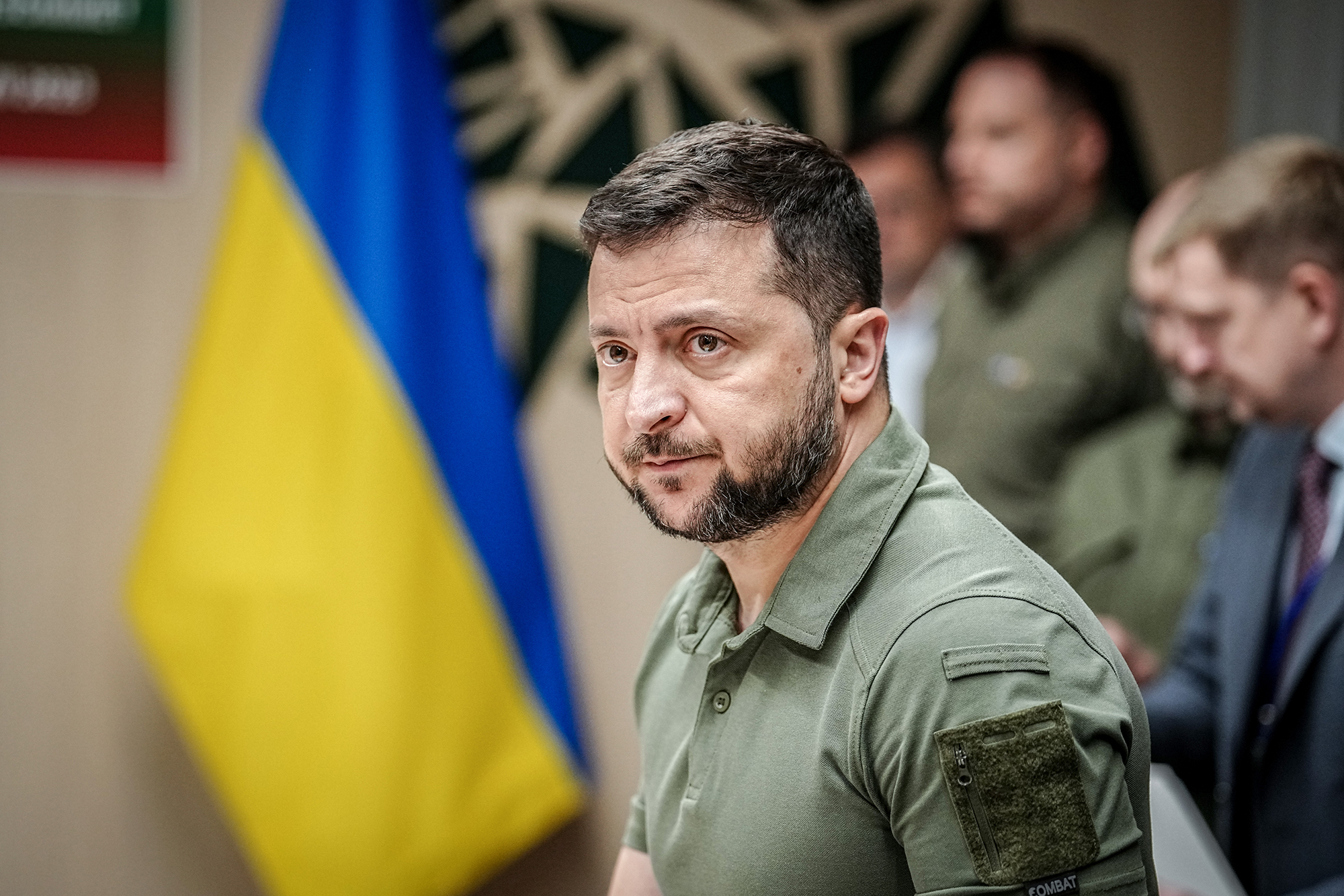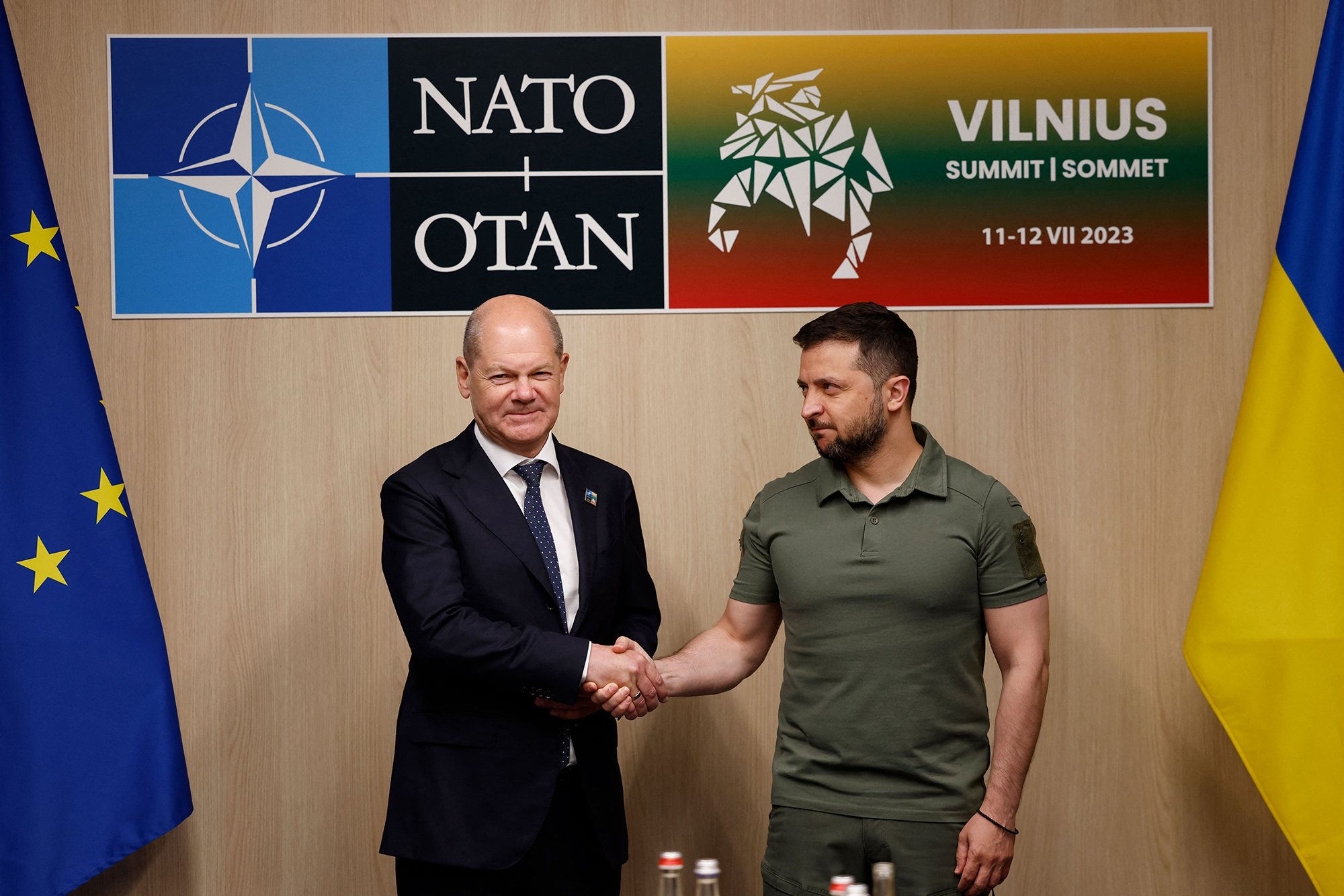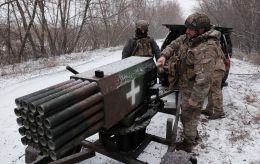NATO membership but after victory. What is the outcome of the summit for Ukraine?
 NATO summit (Photo: Getty Images)
NATO summit (Photo: Getty Images)
How the second day of the NATO Summit unfolded, why the behavior of the Ukrainian delegation abruptly changed, and the real condition Ukraine must meet for membership in the Alliance - a comprehensive report by RBC-Ukraine on the second of the summit in Vilnius.
- Besides ending the war, what are your political goals and expectations ahead of the next summit in Washington? - a Lithuanian journalist asked Volodymyr Zelenskyy during the final press conference.
- I like that you mentioned, "Besides ending the war, what else does Ukraine plan to do before the next NATO summit?" I am very glad that we share the same level of positivity, - the Ukrainian President noticeably brightened up in response.
Throughout the second day of the summit in Vilnius, Zelenskyy sought to demonstrate maximum optimism and repeatedly thanked the participants for the decisions in support of Ukraine. This was in contrast to his strongly critical tone towards them just a day earlier.
Such an unexpected change in demeanor did not go unnoticed by Western media either. When questioned about the reason behind this shift, Zelenskyy responded that his point of view had not changed.
- For me, it was crucial that the focus was on security, that there is a clear understanding that Ukraine will join NATO, that no one will bargain NATO membership, and that the decision will be a genuine political one based on the security situation in Ukraine.

President of Ukraine Volodymyr Zelenskyy (Photo: Getty Images)
It can be assumed that on Wednesday, the Ukrainian delegation realized that their strategy of raising the stakes, pursued in recent months and supported by several Alliance members, did not yield the desired results. Ukraine, for now, remains without clear prospects, not only for membership but also for an invitation to NATO, and it was time to revert to their initial positions.
Western leaders, including those who actively opposed the American and German amendments to the summit's final communiqué just a day earlier, also demonstrated optimism. Even President Joe Biden assured that he "looks forward" to the day when Ukraine's membership in NATO can be celebrated.
During the morning doorstep interviews (brief encounters of leaders with the press upon their arrival at the summit), almost all journalists were interested in the obvious question, which was posed in various interpretations: why was Ukraine not invited to NATO and what specific promises were made instead.
When President of Poland Andrzej Duda approached the microphone, he mainly responded to "his" Polish journalists who caught his attention by addressing him as "Pane Prezydent" (Mister President). For RBC-Ukraine, it was important to pose a question regarding NATO's decision concerning Ukraine specifically to Duda, as he is one of the key advocates for Kyiv's membership in the Alliance. Since he did not respond to the address "Mr. President," we attempted to call him in the same manner as the Polish journalists did, and it worked.
- Pane Prezydent! Are you satisfied with NATO's decision regarding Ukraine? Don't you think it's not enough?
- In my opinion, this (the decision regarding Ukraine at the NATO summit - Ed.) is completely insufficient. I hope that in a few years, Ukraine will become a full member of our Alliance.
Andrzej Duda became the only one who openly stated that the communique proposed to Ukraine by the Alliance was not what the Ukrainian side was seeking. Another active ally of Ukraine, President of Lithuania Gitanas Nauseda, initially did not react to the same question, but later provided a response.
- You better ask Mr. Zelenskyy about that. I believe that this is the maximum we could achieve yesterday. Because no one is talking about membership now. We talk about membership when conditions allow.
Against the general backdrop, the comment of the UK Foreign Secretary, Ben Wallace, stood out. He called on Ukraine to be more grateful for the assistance being provided and reminded that his country is not Amazon.
During the concluding press conference, Zelenskyy was asked about this.
- I simply don't know what he means and how else we should express our gratitude. Let him write to me... We can wake up in the morning and personally thank the Minister. - the President replied and asked Defense Minister Oleksii Reznikov about his relationship with his British counterpart. Reznikov assured that their relationship is excellent, and Zelenskyy asked him to call Wallace and personally thank him. "Will do!" - Reznikov replied with a smile. The whole scene was accompanied by laughter in the hall.
A serious message from Zelenskyy was that he trusts the allies who declare their sincere support for Ukraine's future membership in NATO.
During the second day of the summit, Zelenskyy likely had many discussions, holding bilateral meetings with the leaders of the United States, Germany, France, the United Kingdom, and other countries, and participating in the inaugural session of the newly formed Ukraine-NATO Council.
 Meeting within the framework of the summit (Photo: Getty Images)
Meeting within the framework of the summit (Photo: Getty Images)
The initiative regarding Ukraine's international security guarantees, which has started to take concrete shape, has been met with skepticism by RBC-Ukraine. However, it is clear that serious emphasis is being placed on Bankova Street (the location of the Presidential Office - Ed.) in order to secure long-term assistance to Ukraine from the West, regardless of the results of elections or fluctuations in public opinion. Additionally, on the second day of the summit, Ukraine continued to receive various "gifts" in the form of new packages of military assistance.
However, the shadow cast by the summit's Tuesday communique, in which the allies refrained from providing Ukraine with clear parameters for an invitation to the Alliance, was certainly not dispelled on the second day of the summit.
"The results of the summit are good, but if there was an invitation, they would be ideal," Zelenskyy addressed Stoltenberg during their joint press conference in the afternoon.
In summary, after the summit, it became evident that at least two key capitals, Berlin and Washington, are not willing to take significant steps toward Ukraine as long as the active phase of the war continues. According to sources, the Germans, apart from their usual caution, remain trapped in their post-war pacifist inertia and complexes.

Bilateral meeting between Zelenskyy and Chancellor of Germany Olaf Scholz (Photo: Getty Images)
The fear and hesitancy of Germany and the United States have been a constant subject of criticism for Ukraine, but from the perspective of Germany itself, the progress made in recent years has been significant. It is worth noting that just a few years ago, even supplying Ukraine with a single grenade seemed unthinkable for Berlin.
Like the Germans, the Americans also seem to want to keep maximum room for maneuver. This includes hypothetical peace negotiations with Russia, where Ukraine's NATO membership could become a bargaining chip. Specifically, this is how it is seen in Washington. Zelenskyy directly stated on Wednesday that he would not exchange any "status" (NATO membership) for "any village where at least one old man lives."
The further course of the war is unpredictable, and liberating the entire occupied territory militarily appears to be an extremely challenging task. This also makes Ukraine's path to NATO uncertain. The idea has long been circulating in the media and political circles that Ukraine could join NATO even if a part of its territory remains under the control of others. This would involve making a reservation that Article 5 of the North Atlantic Treaty on collective defense does not apply to that territory.
However, after speaking with a number of informed Western interlocutors, such a concept seems much easier in theory than in practice. Numerous slippery questions arise in that case. For example, if there is shelling of a hypothetical partially controlled Zaporizhzhia from a hypothetical uncontrolled Donetsk, is it a reason to invoke Article 5 or not? After all, Donetsk is also in Ukraine, even though it is evident that the shelling was carried out by the Russian army. Is a single shelling of a Ukrainian border village with a mortar sufficient reason for the Alliance to come to the defense of Ukraine? What if it is not a single shelling but a monthly occurrence? Or a daily one? What if instead of a village, hypothetical Kharkiv is shelled? RBC-Ukraine did not receive clear answers to these questions.
Likely, the West is not trying to find those answers because the main formula of the Vilnius summit goes something like this: if you want to become NATO members, first achieve an unconditional victory over Russia.

